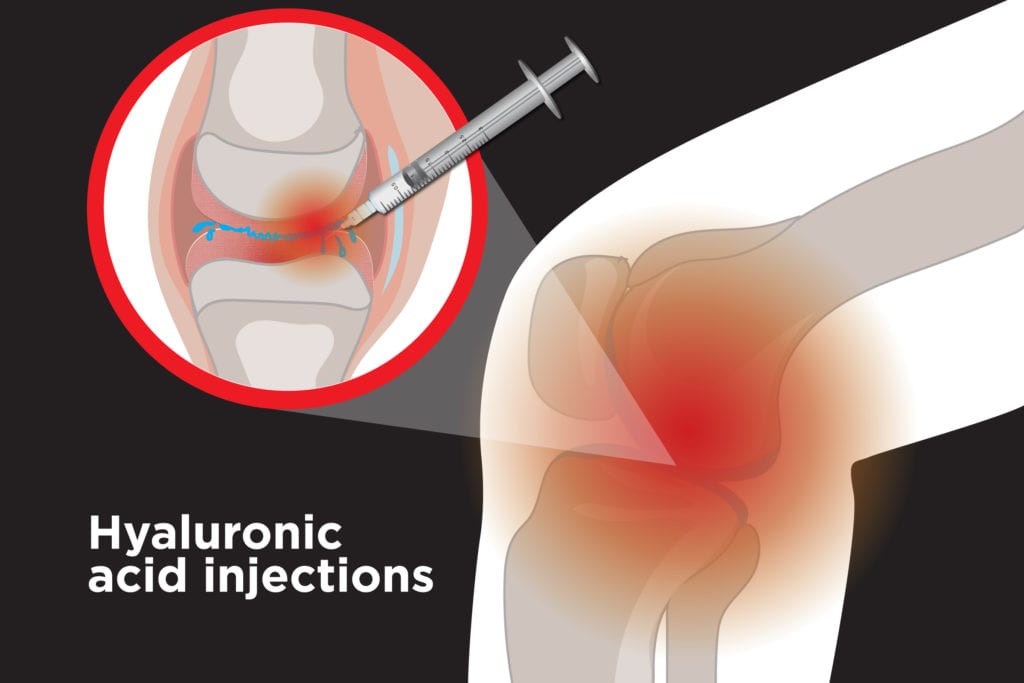

You’ve tried all the conservative therapies for your knee osteoarthritis, and nothing is working. You really, really don’t want to go down the knee replacement surgery road yet. What’s left to try? You might want to consider hyaluronic acid injections for your knee osteoarthritis (OA). Be warned, though: Their effectiveness is up for debate, with medical research not quite backing up how well they work.
Yet, individual patients have reported relief from their arthritis pain with the shots — but not everyone. Even a CreakyJoints Facebook post soliciting feedback on patients’ experiences received responses ranging from “they worked like a dream” and “amazing” to “they did nothing to relieve my OA knee pain” and even “they made my knee worse.”
Read on to find out more and decide if hyaluronic acid injections are worth a “shot” (sorry, bad pun intended) for you.
What Is Hyaluronic Acid, and What Does It Do?
Hyaluronic acid, also known as hyaluronan, is a gel-like substance naturally present in the synovial fluid that lubricates your joints. Because arthritis patients lose hyaluronic acid as their joint wears away, the theory goes that replacing it with a process called viscosupplementation would make using the joint less painful. The injections are FDA-approved for knee osteoarthritis.
“Its mechanism of action [how a hyaluronic acid injection works] is not fully known, but is thought to at least temporarily increase the viscosity, or thickness, of the fluid that surrounds the joint it is injected into,” says Donald Miller, PharmD, a professor at the School of Pharmacy at North Dakota State University. “This may reduce pain and make joint movement easier.”
You can think of it like WD-40 for your joints.
Why Would an Arthritis Patient Get Hyaluronic Acid Injections vs. Other Treatments?
Typically, you would try other conservative treatments first, like weight loss, exercise, NSAID medications, and steroid injections. If those don’t help, hyaluronic injections may be an option.
Some patients might have other conditions for which for first-line treatments would be contraindicated. Some doctors might use hyaluronic acid injections along with steroid injections as well. “I had the injection every week for three weeks along with cortisone injections,” Sharon Ruoto told us on Facebook. “I did this every six months for years.”
Although hyaluronic acid is also available as a pill, the shots are usually preferred. “Advantages [to shots] are targeted relief to the joint with no systemic side effects from pills, and the convenience of not taking pills by mouth,” Dr. Miller says. Brand names of the hyaluronic acid shot include Euflexxa, Supartz, and Synvisc-One.
Is It Worth Getting Hyaluronic Acid Shots to Delay a Knee Replacement? Should You Just Get the Surgery?
Hyaluronic acid injections are often a last-ditch effort before knee replacement surgery. “It bought me a year before replacements,” Cathy Anderson Eberhardt told us on Facebook. But because the shots don’t actually appear to affect the disease progression, some medical professionals think they just put off the inevitable, and only serve to tack on additional health care costs. “For some people it can delay surgery or can avoid it altogether, but hyaluronans will generally not avoid eventual surgery in badly affected knees,” Dr. Miller says. But, they “will be helpful in patients not quite mentally ready for surgery.”
Where Are Hyaluronic Acid Shots Given? Do They Hurt?
If you are going to get hyaluronic acid injections, the actual process is fairly simple. “They are directly injected into the affected knee joint, specifically within the synovial fluid that bathes the joint,” Dr. Miller says. “Like any injection, it may seem more painful to some people than others, but there should not be a lot of pain since a sharp needle is used and the joint may be numbed first with a local anesthetic.”
How Long Does Relief Last?
“It is quite variable but many patients report six months of relief, and the injections may be repeated every six months or based on physician judgement,” Dr. Miller says. Our Facebook community confirms this, with most patients telling us relief lasted from four to six months; they got the shots (or series of shots) every six months. But, as Sarah Quina shared, “they don’t work repeatedly forever.” Also, the shots may take several weeks to go into effect, unlike steroid injections, which work much faster.
What Are the Side Effects of Hyaluronic Acid Shots?
The shots are usually low risk, but some side effects may occur. “Typical side effects include pain, swelling, heat, redness, and/or fluid build-up around the knee,” Dr. Miller says. “Rest and ice afterward can help prevent the typical side effects.”
More rarely, infections of the joint are possible, as is damage to other parts of the knee, he says. “However, properly trained physicians will deliver an injection with very little risk of complications,” Dr. Miller says.
Why Don’t Some Medical Groups Recommend Hyaluronic Acid Shots?
Even though some patients have gotten relief from these shots, some professional organizations, such as the American Academy of Orthopaedic Surgeons, don’t recommend them due to the lack of robust scientific evidence of their effectiveness. “Some studies have found these injections are not more effective than placebo injections,” Dr. Miller says. “However patients get a lot of relief from placebo effects of any injection, so this makes it difficult to show the independent effect of the hyaluronan.” In addition, given the expense of hyaluronan injections, he says, many insurance companies are reluctant to pay for something only a little better than placebo. “I pay for them from Canada because my insurance won’t cover,” Quina told us on FB.
If you’re interested in hyaluronic acid injections for your OA, talk to your doctor and check with your insurance company to see if they may be an option for you.
Keep Reading
Subscribe to CreakyJoints
Get the latest arthritis news in your inbox. Sign up for CreakyJoints and hear about the latest research updates and medical news that could affect you.





